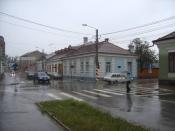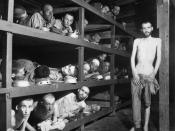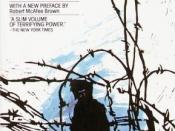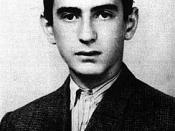It's strange how contrasting the idea of flames can be. For instance, in the beginning of the year when we read a story titled The Ambiguous Guest, by Nathaniel Hawthorne, the motif of flames appeared within the text and was believed by our class to play a positive role. We gained this idea from the connection made by Hawthorne of flames to such things as warmth, happiness, light, families gathered around a hearth and many other examples of optimism found all throughout the story. However, we then came across the book Night, by Elie Wiesel, where the motif of flames also appeared but this time in a whole new way. In this autobiography where Wiesel writes about his imprisonment in Auschwitz, one of the numerous concentration camps created by Hitler, he connected flames with something completely the opposite of Hawthorne, something negative to the point where he suggests the flames indicate a presence of Hell on Earth.
There are many images in the book that led our class to believe that the flames indicated Wiesel's Hell on Earth. To begin, there are many descriptions of such things as crematories, smoke rising from chimneys of the crematories and ultimately the ashes, which are all that is left over once the fire within the crematories disperses. These were completely different pictures compared to those of Hawthorne, and the feelings associated with them were completely different as well. In Auschwitz camp there was no light, no happiness, and definitely no families gathered around a hearth. However there was instead a loss of all hope, prisoners gathered in groups to be burned in the crematory and the dread of one never ending night: "Never shall I forget that Night, the first night in camp which has turned my life into one long night, seven times cursed and seven times sealed. Never shall I forget that smoke. Never shall I forget the little faces of the children, whose bodies I saw turned into wreaths of smoke beneath a silent blue sky... Never shall I forget those flames which consumed my faith forever." (43)
However, it is not necessarily just theses horrible images that suggest a Hell on Earth. But further, it is the people of these camps' eventual acceptance of these occurrences and later total disregard for what is humane that leads to this morbid atmosphere. Upon arrival in these camps, the prisoners are always at first petrified by all that goes on but then something terrible happens. After only a few short months, what goes on in these camps is able to suck the soul out of anyone there because the sheer horror changes them, and so it is the fact that these camps lead to a loss of humanity and the fact that a world without humanity would be Hell is why these camps literally became a Hell on Earth for Wiesel: "... I too had become a completely different person. The student of the Talmud, the child that I was, had been consumed in the flames. There remained only a shape that looked like me. A dark flame had entered into my soul and devoured it." (46)
The first appearances of the flame motif came from the character Madame Schäcter, who was preaching to her fellow Jews about the upcoming flames even before she could see them. She experiences constant fits in which she burst into tears unexpectedly and can't stop herself from screaming about the flames and the fire which she is seeing. And every time she has to be restrained by others with force, for they think that she has gone mad and also fear that her tantrums will cost them their lives. However, what is really happening is that Wiesel is using this character to foreshadow the times yet to come, as the flames which she claims to see do become real for these people as does the fear which is associated with them.
Examples of the attitudes of the camp prisoners upon arrival came along early in the book, like on page 47 where it said: "...Here the word 'furnace' was not a word empty of meaning: it floated on the air, mingling with the smoke. It was perhaps the only word which did have any real meaning here..." This quote shows the feelings of the group of people who were new along with Wiesel, who were blown away by the fear within them at the knowledge of what was happening where they were. By saying that 'the word furnace was not a word empty of meaning' and that 'it floated on the air, mingling with the smoke', it was because the people knew the sight of this furnace was responsible for the burning flesh they smelt, and for the smoke which they knew carried the souls of many of their fellows. It was expected that they experience such feelings, even hoped for, because disgust at such a sight would indicate morals and humanity, for obviously burning people is something that just should not happen. That is what Wiesel was getting at anyway, that there should be disgust at such things going on, but it is the change of this opinion by those in the book that worries him, for something this ghastly should never be accepted.
An example of the change comes along a little later in the book, soon after the character Akiba Drumer meets the fate of the crematory: "'...Say the Kaddish for me'...We promised him. In three days' time, when we saw the smoke rising from the chimney, we would think of him... These were terrible days. We received more blows than food; we were crushed with work... And three days after he had gone we forgot to say the Kaddish..." (83) This was a huge drop in the morale at the camp, for these people who were once totally committed to their religion and to each other had forgotten to do the one thing a dying comrade had asked of them to do, and that one thing was to say the Kaddish which was at one time something they did without thinking. At the mention of 'received more blows than food' and being 'crushed with work' goes to show how the camp got to them, to the point where it was literally crushing them physically and mentally. Proof was the fact that they forgot to say the Kaddish even though they saw 'the smoke rising from the chimney' which in turn shows that it was beginning to have no effect. Not being affected by a sight that means someone close to you was just killed is a problem, as Wiesel continues to argue in his proving of the establishment of Hell on Earth.
The last straw comes near the end of the book when the effect of the chimney's on these people after nearly a year in camp is bluntly stated: "Right next to us the high chimney of the crematory oven rose up. It no longer made any impression on us. It scarcely attracted our attention." (109) Even though the same appalling things that happened earlier in the book were still occurring at this point, the opinion of those who have been there for so long has clearly changed. By saying that 'it scarcely attracted our attention' is a big deal, and the problem according to Wiesel. No longer caring about mass murder shows a complete loss in humanity and in the end a Hell on Earth, the point this author was trying to prove all along.
And so, it is through Wiesel's development of the flame motif that we are able to gather that he believes their presence indicates a Hell on Earth. By showing how the prisoners' moods in Auschwitz camp went from being petrified at the sight of flames to hardly paying them any attention to finally just not acknowledging their presence at all, shows how this camp ripped the souls out of its occupants which in turn led to a loss of humanity. The Earth without humanity would cease to be any different from Hell, and so that is why the motif of flames is representational to Wiesel's Hell on Earth.





